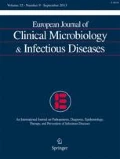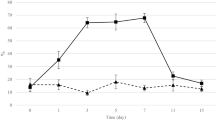Abstract
The presence of an antibiotic in the intestinal tract as a result of oral administration or intestinal excretion can have a pronounced impact of the microflora. Studies of the effect on the intestinal microflora and faecal excretion should therefore be carried out in volunteers and patients when new antibacterial agents are evaluated. These two analyses should be combined in the evaluation.
Similar content being viewed by others
References
Nord CE, Heimdahl A, Kager L: Ecological impact of different antimicrobial agents on the human normal microflora. Current experience and results 1980–1988. Zeitschrift für antimikrobielle und antineoplastische Chemotherapie 1989, 7: 11–18.
Nord CE, Heimdahl A, Kager L: Antimicrobial induced alterations of the human oropharyngeal and intestinal microflora. Scandinavian Journal of Infectious Diseases 1986, 49:64–72.
Nord CE, Heimdahl A, Kager L, Malmborg AS: The impact of different antimicrobial agents on the normal gastrointestinal microflora of humans. Reviews of Infectious Diseases 1984, 6, Supplement: 270–275.
Sutter VL, Citron DM, Edelstein MAC, Finegold SM: Wadsworth anaerobic bacteriology manual. Star Publishing, Belmont, 1985, p. 92–98.
Author information
Authors and Affiliations
Rights and permissions
About this article
Cite this article
Nord, C.E. Studies on the ecological impact of antibiotics. Eur. J. Clin. Microbiol. Infect. Dis. 9, 517–518 (1990). https://doi.org/10.1007/BF01964294
Issue Date:
DOI: https://doi.org/10.1007/BF01964294




